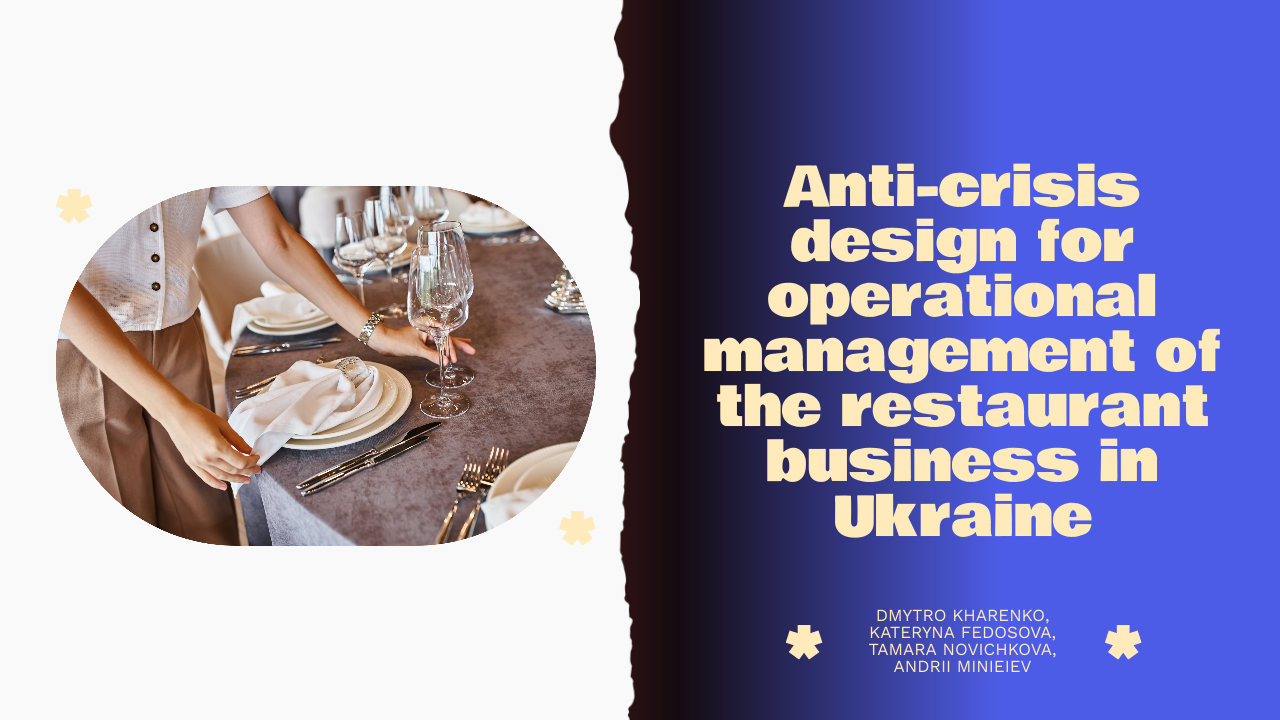Anti-crisis design for operational management of the restaurant business in Ukraine
DOI:
https://doi.org/10.15587/2706-5448.2024.303613Keywords:
restaurant business, crisis management, digital innovations, business process optimization, effective communications, efficiency management, business model flexibilityAbstract
The object of this research is the impact of the crisis caused by military actions in Ukraine on the restaurant business. The study aims to examine the adaptation strategies that restaurants use for survival and development in the face of sudden economic changes and increasing uncertainty. The problems addressed in the study include responding to the loss of customers, rising food prices, decreasing cash flows, and a shortage of qualified workers.
The main findings of the study showed that restaurants that successfully adapt implement comprehensive changes: from digitalizing ordering and delivery processes to revising menus and optimizing resource use. These steps not only reduce costs but also improve operational efficiency, which is crucial for maintaining customer loyalty and attracting new customers. Specifically, restaurants that invested in digitalization (e. g., electronic menus, online ordering, and inventory management systems) reported a 30–40 % increase in sales compared to those that did not implement such changes. Restaurants that implemented strategies for staff retention and cost optimization reduced staff turnover by 25 % and increased productivity by 20 %.
The results are explained by the implementation of innovative approaches and strategic rethinking of business models, which allow quick responses to changing market conditions and consumer needs. Effective use of digital technologies and optimization of internal processes have become key success factors.
The data obtained have significant theoretical and practical value, as they can be used to develop recommendations aimed at improving the resilience and adaptability of the hospitality industry in crisis conditions. These results help understand how managers can use strategic planning to optimize business processes and ensure enterprise stability. The importance of the research is also highlighted by identifying future research directions that can help the restaurant business more effectively adapt to changing market conditions and global crises.
References
- Messabia, N., Fomi, P.-R., Kooli, C. (2022). Managing restaurants during the COVID-19 crisis: Innovating to survive and prosper. Journal of Innovation & Knowledge, 7 (4), 100234. doi: https://doi.org/10.1016/j.jik.2022.100234
- Najib, M., Abdul Rahman, A. A., Fahma, F. (2021). Business Survival of Small and Medium-Sized Restaurants through a Crisis: The Role of Government Support and Innovation. Sustainability, 13 (19), 10535. doi: https://doi.org/10.3390/su131910535
- Motoc, A. (2020). Crisis Management and Resilience for Restaurants in Romania during the COVID-19 Pandemic. Management Dynamics in the Knowledge Economy, 8 (4), 435–449. doi: https://doi.org/10.2478/mdke-2020-0028
- Li, B., Zhong, Y., Zhang, T., Hua, N. (2021). Transcending the COVID-19 crisis: Business resilience and innovation of the restaurant industry in China. Journal of Hospitality and Tourism Management, 49, 44–53. doi: https://doi.org/10.1016/j.jhtm.2021.08.024
- Hnennyi, О., Charkina, T., Polishko, T., Hrebeniuk, H., Pikulina, O. (2021). Tools for anti-crisis management of tourism and hotel and restaurant business. Ekonomika ta Derzhava, 4, 18–22. doi: https://doi.org/10.32702/2306-6806.2021.4.18
- Bebko-Minaieva, O. (2022). Yak vidnovyty restorannyi biznes pid chas viiny: Dosvid spivvlasnytsi restorannoi merezhi Rose Family. Womo.ua. Available at: https://womo.ua/yak-vidnoviti-restoranniy-biznes-pid-chas-viyni-dosvid-spivvlasnitsi-restorannoyi-merezhi-rose-family/
- Maritz, A., Perenyi, A., de Waal, G., Buck, C. (2020). Entrepreneurship as the Unsung Hero during the Current COVID-19 Economic Crisis: Australian Perspectives. Sustainability, 12 (11), 4612. doi: https://doi.org/10.3390/su12114612
- Kim, J., Kim, J., Wang, Y. (2021). Uncertainty risks and strategic reaction of restaurant firms amid COVID-19: Evidence from China. International Journal of Hospitality Management, 92, 102752. doi: https://doi.org/10.1016/j.ijhm.2020.102752
- Huzar, U. E., Levchuk, А. В. (2023). Analysis of Restaurant Business Establishments in Ukraine During the War. Problems of Modern Transformations. Series: Economics and Management, 9. doi: https://doi.org/10.54929/2786-5738-2023-9-12-01
- Krasnokutska, I., Segeda, I., Bezpalova, A. (2023). Post-war restoration of the tourism industry of Ukraine in the context of sustainable development. Economy and Society, 56. doi: https://doi.org/10.32782/2524-0072/2023-56-88
- Motsa, A., Shevchuk, S., Sereda, N. (2022). Prospects of the post-war recovery of tourism in Ukraine. Economy and Society, 41. doi: https://doi.org/10.32782/2524-0072/2022-41-31

Downloads
Published
How to Cite
Issue
Section
License
Copyright (c) 2024 Dmitro Kharenko, Kateryna Fedosova, Tamara Novichkova, Andrii Minieiev

This work is licensed under a Creative Commons Attribution 4.0 International License.
The consolidation and conditions for the transfer of copyright (identification of authorship) is carried out in the License Agreement. In particular, the authors reserve the right to the authorship of their manuscript and transfer the first publication of this work to the journal under the terms of the Creative Commons CC BY license. At the same time, they have the right to conclude on their own additional agreements concerning the non-exclusive distribution of the work in the form in which it was published by this journal, but provided that the link to the first publication of the article in this journal is preserved.







